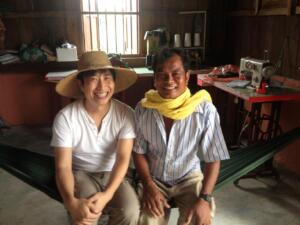
Mr. Kurta's home and fields are located just a short distance to the Thai border. Neighbors are migrant workers for construction labor in Thailand, working at construction sites in Bangkok and elsewhere.
When I carried the seeds for this year's sower, I was a little happy. The home came with a fine window and a used sewing machine.
I signed a contract with Mr. Kurta to buy his cotton at more than double the price of the international market. Kurta-san had saved little by little and bought a used Japanese-made sewing machine for his daughter's domestic work.
In 2011, the price of cotton soared to four times its previous price. If cotton, the raw material, were that expensive, the products that consumers purchase should also be more expensive, but in reality, there was little impact.
Cotton really only accounts for a very small percentage of cotton products. Increasing the purchase price of cotton could be an opportunity to solve the problem of poverty and provide security in the area.
I brought a stole made from cotton grown by Mr. Kurta as a souvenir, but he couldn't seem to imagine that it was something he had made.
We returned to downtown Battambang with the hope that the Kurta family would serve as a successful model and that other farmers would return to the area, which is riddled with landmines, and that a village community could be formed.
